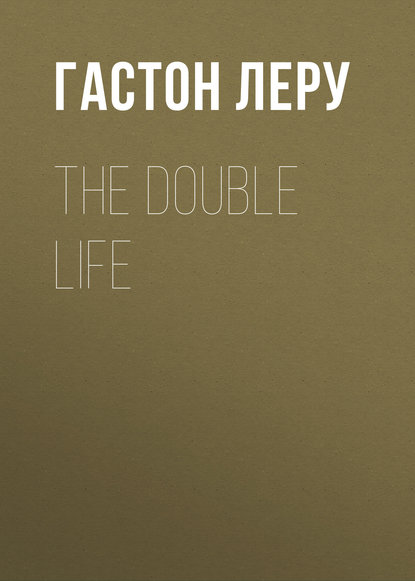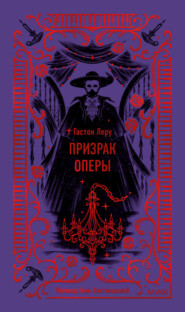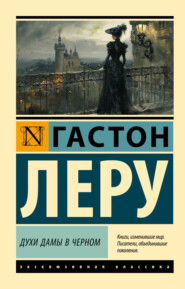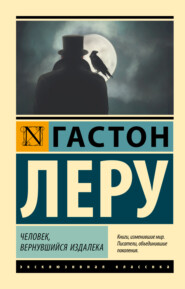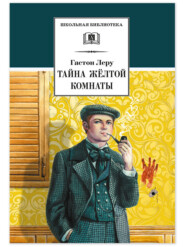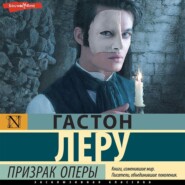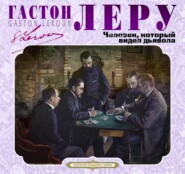По всем вопросам обращайтесь на: info@litportal.ru
(©) 2003-2024.
✖
The Double Life
Автор
Год написания книги
2018
Настройки чтения
Размер шрифта
Высота строк
Поля
CHAPTER V
Théophraste Remembers Himself
THEOPHRASTE sang the song in loud, strident tones, his eyes sparkling, glass in hand. It was with indescribable surprise that the company received it, and despite the richness of the rhyme, the couplet was followed by no applause. An awkward silence followed, and all the ladies looked to Marceline for an explanation.
What was it that Marceline could explain? Adolphe himself looked at Théophraste in surprise; but Théophraste, as if possessed with the devil, continued with the second couplet of the drinking song. When he had finished, he sat down, looked around with satisfaction, and said to Marceline, “What do you think of that, Marie Antoinette?”
In the midst of a death-like silence preserved by all, Marceline asked tremblingly, “Why do you call me Marie Antoinette?”
“Because you are the most beautiful of all!” cried Théophraste. “I appeal to Madame la Marechale de Bouilleurs, who has taste. I appeal to all of you. And there is not one who, by the signet of the Pope, will contradict me, neither the Eros Picards, nor the Bourbons, nor the Burgundias, nor the Provincials, nor the Poet St. Jack, nor Gatelard, nor Bras-de-Fer, nor Guente Noir, not even Bal-a-voir.”
M. Théophraste had on his right old Mlle. Tabouret, and he pinched her knee as he looked at Marceline, which nearly made that austere person faint. No one dared to move; for the fiery look of Théophraste frightened the whole company. He leaned amorously towards Mlle. Tabouret, and said to her, staring at Marceline, who was by this time weeping: “Let us see, Mlle. Tabouret, am I not right? To whom can I compare her? Is it La Belle Laitere, or La Petite Minion; or even La Blanche of the bowling alley; or La Belle Helene, who kept the Harp Tavern?”
Turning towards Adolphe, he said with great energy, “Come you, Va-de-Bon Cour, tell me your opinion. Look at Marie Antoinette a little while. By the fatted calf, she puts them all in the shade: Jeannette, the flower girl of the Royal Palace; Marie Leroy and the female Solomon, the beauty of the Temple; Jeanne Bonnefoy, who kept the café of the Port Marie; Manon de Versailles, the poultry girl-none of them approach her in beauty.”
He then leapt with one bound upon the table, and breaking the dishes, cups and plates into a thousand pieces, held his glass over his head and shouted, “Let us drink to the Queen of the Nymphs, Marie Antoinette.”
Draining his glass, he smashed it against the table and waved his hand, which was covered with blood. By this time the party had fled in terror, fearing that some tragedy would follow Théophraste’s strange behavior. On superficially thinking of these curious actions one would immediately conclude that he had gone mad or was drunk, but this was not the case. There is another kind of sense beside common sense. It was not because he was crazy or drunk that he could sing a song that he had never learnt, speak a language that he had never heard, or refer to people that he had never read about, who had been dead for centuries. There must have been some other force working in his brain.
Modern scientific experiments have shown with indisputable examples that this particular case was far from unique. Ignorant people, who neither knew how to read or write, who had never been outside their village, have been known to give most correct answers to the medium who questioned them in a dead language. And this has been before professors of colleges, not before charlatans. It is difficult to explain. It is the mystery of this life, the life hereafter. Some say that it is a learned spirit talking through these ignorant mouths, others have timidly expressed the opinion that such phenomena can only be explained by the remembrance of a former life. Therefore the things which Théophraste said and did without understanding, the Other who relives in him at intervals understands perfectly well, and if we would understand them we must know who this Other is.
As to Théophraste, after the guests had disappeared from the tent, he climbed down from the table. He found it more difficult to reach the floor than it had been to climb upon the table, and he knelt down, taking great precaution not to fall. He then assumed his natural self and called Marceline. She did not answer him, and in searching for her he found her trembling with fright in her room. He closed the door carefully and prepared to give an explanation. She looked at him with her large eyes, amazed, filled with tears, and he felt it his duty as a husband not to conceal from her any longer this extraordinary phenomenon which had been preoccupying his mind.
The night was ideal, and after they had retired he said to her, “My dear Marceline, you cannot understand what has happened to me this evening, and I can assure you I don’t understand myself, but in telling you all I know perhaps we can arrive at some conclusion.”
He then related all the details of his visits to the cellars of the Conciergerie. He concealed nothing, and sketched in minute details the extraordinary feelings which had actuated him that evening, and the unknown influence which had commanded him. At first she said nothing, but softly moved away from him as if afraid of him; but when he came to the document which revealed the existence of the treasures, she demanded to see it at once. He judged then that she was taking an interest in the adventure and felt thankful. They got up and he showed her the paper in the light of the full moon, which was streaming into the room. Like all those who had seen it before, she recognized the handwriting immediately, and made the sign of the cross as if fearing some sorcery. Marceline was not a fool, but explained that she could not help making the sign. However, she soon became composed, and began to praise Adolphe, who, in spite of Théophraste’s disapproval, had initiated her into the elements of spiritualism, a science she said which would be of some service to Théophraste in his condition. But even in the face of that uncontestable evidence she found it difficult to believe that he was a reincarnated spirit dating back two hundred years, until he asked her who she thought he had been.
Marceline didn’t think that he had been a very great personage, and in reply to his disappointed inquiry she said:
“Because this evening you sang in slang, and the ladies whose names you mentioned do not belong to the aristocracy. People who frequented La Terpidere, La Platire, Manon de Versailles, I think are not of much account.”
“But I also mentioned the leader of the Bouffleurs,” replied Théophraste, “and you know that morals were so dissolute under the Regency of the Duke of Orleans that the fashion at Court was to call the ladies in slighting terms. What do you think of the idea of me being the Bastard of the Regent?”
For sole response she embraced Théophraste in delight, and recollecting his duty on this day of celebration proved to her that if he was more than two hundred years old, his love always remained youthful.
CHAPTER VI
M. Lecamus Expresses His Views
AFTER a while Marceline was able to persuade Théophraste to confide in M. Adolphe Lecamus. She declared that Adolphe’s great experience, his certain knowledge of the science of metaphysics, ought to be a great help to a man who had buried treasures two hundred years before and wished to find them again. “And,” she added, “it is he who will be able to reveal your identity.”
He yielded to her persuasions, and in the morning told Adolphe everything. Adolphe was astonished, and it surprised Théophraste that a man who professed Spiritualism should show so much emotion when face to face with a reincarnated spirit. He said that Théophraste’s conduct at the dinner table the day before and the words he uttered to him before and since the visit to the Conciergerie were well calculated to prepare him for such a confidence, but he did not expect such a thing as this. He demanded to see the proof of such a phenomenon. Théophraste readily showed the document, and Adolphe could not deny the authenticity of it. He recognized the handwriting at once, and exclaimed, upon examination, that the handwriting explained many things to him. He had often thought how curiously the characters in Théophraste’s handwriting differed from his real character. It had always been difficult for him to associate the handwriting with Théophraste.
“Really,” said Théophraste, “what character do you ascribe to me?”
“Well, if you will promise not to bear me any ill, I will tell you!”
On this assurance he painted Théophraste’s character. It was that of a kind citizen, an honest merchant, an excellent husband, but a man incapable of showing any firmness, wit or energy. He told him also that his timidity was excessive, and that kindness was always ready to degenerate into weakness. The picture was not at all flattering, and Théophraste felt a little hurt.
“And now,” said he, “that you have told me what you think of my character, tell me what you think of my writing.”
Then he made observations on his handwriting which would not have failed to make him quite angry if he had not remembered that Signor Petito had said the same. He said:
“Your writing expresses all the contrary sentiments in your nature as I know it, and I can imagine nothing more antithetical than your writing and your real character. Thus you do not write a characteristic hand, but the handwriting of the Other.”
Théophraste was deeply interested. He thought of the strength and energy of the Other, he imagined that he was a great captain. However, Adolphe’s next remark completely disillusioned him.
“Any sign in those formations, in the pointed fashion they have of reuniting, and in the way of growing tall and of climbing up, and of passing each other, show energy, firmness, obstinacy, ardor, activity, and ambition, but all for evil.”
This dismayed him, but he exclaimed with a show of spirit: “Where is the evil? Where is the good? If Attila had known how to write perhaps he would have written like Napoleon.”
“They called Attila the scourge of God.”
“And Napoleon the scourge of man,” replied Théophraste, with difficulty controlling his anger.
How could it be that Théophraste Longuet could have been anything else but an honest being before his birth, during his life, and after his death?
Marceline agreed with him, and Adolphe fearing that he had gone too far made apologies.
CHAPTER VII
Théophraste and His Black Plume
FOR the next few days M. Lecamus and M.
Longuet occupied themselves with evidence of this phenomenon, and were often seen together, conversing mysteriously, in the bar-rooms and about town, about the treason of the first of April. They left the Villa Flots d’Azure to return to Paris, with the intention of searching the libraries. They worked diligently for several days without any result, until M. Longuet began to lose spirit. M. Lecamus was more patient.
One evening as they were walking towards the Rond Point, in the Champs Elysees, he turned around and said, “What can we do to find the approximate place where the treasures are buried if you have not your black plume?” Théophraste and Marceline could not understand this, and asked for an explanation. He commented:
“You have heard of the water witches who could discover water by the aid of a wand, by a phenomenon which nobody has as yet been able to explain. These witches traced water across the various beds of earth, and by pointing the little rods, indicated where it was necessary to dig in order to make a well. I do not despair of showing you, Théophraste, where your treasures are buried. I will conduct you over the ground shown in the document, and tell you where it is that you must dig to find your treasure.”
“Yes,” interrupted Théophraste, “but this does not explain to us what you mean by ‘the black plume.’”
“I am coming to that now. I am obliged to speak of Darwin. You will understand directly. You know that Darwin devoted himself to several celebrated experiments, of which the best known is that with pigeons.
“Desirous of accounting for the phenomenon of heredity and the value that he attached to it, he closely studied the breeding of pigeons, which is sufficiently rapid to have enabled him to draw conclusions upon an appreciable number of generations. At the end of the tenth generation he found the same type of pigeon, with the same defects, the same qualities, the same form, the same outline, and the same black plume there in the same place where the first pigeon had a black feather. Very well! With that I will prove to you that it is the same with souls as it is with bodies.
“At the end of the tenth generation, we find the same soul, as far as it exists, with the same defects, the same virtues, and, as it were, with the original black feather. While giving you this illustration, it is necessary to distinguish between the soul which reappears thus hereditarily, and that which comes back by reincarnation. Believing that it is the result of a unique combination which nothing can oppose, and, since it dwells in a case called a body, is hereditary in the same degree as that body, an hereditary soul which comes from an ancestor always has his black feather, while a soul which comes back by reincarnation finds itself in a body which is in no way prepared to receive it. The aggregate materials of this body are original, and decaying, momentarily impose a silence on that soul.
“But a time comes when this soul becomes the strongest, when it speaks, when it shows itself entirely, just as the black feather does.
“Now, Théophraste, for several generations you were the honest gardeners in the Ferte-sous-Jonarre. But when that soul speaks in you, you are no longer yourself. Théophraste Longuet has disappeared. It is the Other who is there. It is the Other who has the gesture, the manner, the action, the black feather. It is the other who recalls the mystery of the treasure, it is the Other who remembers the Other.”
“Oh! This is admirable!” exclaimed Théophraste, who was so deeply moved that he could hardly refrain from weeping with excitement. “And now I understand what you mean by my black feather. My black feather returns to me when I am the Other.”
“And he will help you then, my friend,” declared Adolphe with conviction. “But until we have released the unknown who is hidden in Théophraste Longuet, and until he lives with sufficient strength, audacity, and liberty, until he is resuscitated, in a word, until he appears to us with his ‘black feather,’ we will confine ourselves to the study of that interesting document which you brought from the Conciergerie. Let us make a plan for penetrating the mystery. We will find out exactly where the treasures are buried, but we must wait for the spirit who dwells in you to say to us, ‘It is there.’”
“My friend,” said Marceline, overflowing with admiration, “you talk like a book, and I wonder that you have not more often tried to teach us these things, for we are so ignorant. You must not leave a stone unturned to find the treasure. I do not fear the destruction of the earth on account of the object of our search.”
Théophraste Remembers Himself
THEOPHRASTE sang the song in loud, strident tones, his eyes sparkling, glass in hand. It was with indescribable surprise that the company received it, and despite the richness of the rhyme, the couplet was followed by no applause. An awkward silence followed, and all the ladies looked to Marceline for an explanation.
What was it that Marceline could explain? Adolphe himself looked at Théophraste in surprise; but Théophraste, as if possessed with the devil, continued with the second couplet of the drinking song. When he had finished, he sat down, looked around with satisfaction, and said to Marceline, “What do you think of that, Marie Antoinette?”
In the midst of a death-like silence preserved by all, Marceline asked tremblingly, “Why do you call me Marie Antoinette?”
“Because you are the most beautiful of all!” cried Théophraste. “I appeal to Madame la Marechale de Bouilleurs, who has taste. I appeal to all of you. And there is not one who, by the signet of the Pope, will contradict me, neither the Eros Picards, nor the Bourbons, nor the Burgundias, nor the Provincials, nor the Poet St. Jack, nor Gatelard, nor Bras-de-Fer, nor Guente Noir, not even Bal-a-voir.”
M. Théophraste had on his right old Mlle. Tabouret, and he pinched her knee as he looked at Marceline, which nearly made that austere person faint. No one dared to move; for the fiery look of Théophraste frightened the whole company. He leaned amorously towards Mlle. Tabouret, and said to her, staring at Marceline, who was by this time weeping: “Let us see, Mlle. Tabouret, am I not right? To whom can I compare her? Is it La Belle Laitere, or La Petite Minion; or even La Blanche of the bowling alley; or La Belle Helene, who kept the Harp Tavern?”
Turning towards Adolphe, he said with great energy, “Come you, Va-de-Bon Cour, tell me your opinion. Look at Marie Antoinette a little while. By the fatted calf, she puts them all in the shade: Jeannette, the flower girl of the Royal Palace; Marie Leroy and the female Solomon, the beauty of the Temple; Jeanne Bonnefoy, who kept the café of the Port Marie; Manon de Versailles, the poultry girl-none of them approach her in beauty.”
He then leapt with one bound upon the table, and breaking the dishes, cups and plates into a thousand pieces, held his glass over his head and shouted, “Let us drink to the Queen of the Nymphs, Marie Antoinette.”
Draining his glass, he smashed it against the table and waved his hand, which was covered with blood. By this time the party had fled in terror, fearing that some tragedy would follow Théophraste’s strange behavior. On superficially thinking of these curious actions one would immediately conclude that he had gone mad or was drunk, but this was not the case. There is another kind of sense beside common sense. It was not because he was crazy or drunk that he could sing a song that he had never learnt, speak a language that he had never heard, or refer to people that he had never read about, who had been dead for centuries. There must have been some other force working in his brain.
Modern scientific experiments have shown with indisputable examples that this particular case was far from unique. Ignorant people, who neither knew how to read or write, who had never been outside their village, have been known to give most correct answers to the medium who questioned them in a dead language. And this has been before professors of colleges, not before charlatans. It is difficult to explain. It is the mystery of this life, the life hereafter. Some say that it is a learned spirit talking through these ignorant mouths, others have timidly expressed the opinion that such phenomena can only be explained by the remembrance of a former life. Therefore the things which Théophraste said and did without understanding, the Other who relives in him at intervals understands perfectly well, and if we would understand them we must know who this Other is.
As to Théophraste, after the guests had disappeared from the tent, he climbed down from the table. He found it more difficult to reach the floor than it had been to climb upon the table, and he knelt down, taking great precaution not to fall. He then assumed his natural self and called Marceline. She did not answer him, and in searching for her he found her trembling with fright in her room. He closed the door carefully and prepared to give an explanation. She looked at him with her large eyes, amazed, filled with tears, and he felt it his duty as a husband not to conceal from her any longer this extraordinary phenomenon which had been preoccupying his mind.
The night was ideal, and after they had retired he said to her, “My dear Marceline, you cannot understand what has happened to me this evening, and I can assure you I don’t understand myself, but in telling you all I know perhaps we can arrive at some conclusion.”
He then related all the details of his visits to the cellars of the Conciergerie. He concealed nothing, and sketched in minute details the extraordinary feelings which had actuated him that evening, and the unknown influence which had commanded him. At first she said nothing, but softly moved away from him as if afraid of him; but when he came to the document which revealed the existence of the treasures, she demanded to see it at once. He judged then that she was taking an interest in the adventure and felt thankful. They got up and he showed her the paper in the light of the full moon, which was streaming into the room. Like all those who had seen it before, she recognized the handwriting immediately, and made the sign of the cross as if fearing some sorcery. Marceline was not a fool, but explained that she could not help making the sign. However, she soon became composed, and began to praise Adolphe, who, in spite of Théophraste’s disapproval, had initiated her into the elements of spiritualism, a science she said which would be of some service to Théophraste in his condition. But even in the face of that uncontestable evidence she found it difficult to believe that he was a reincarnated spirit dating back two hundred years, until he asked her who she thought he had been.
Marceline didn’t think that he had been a very great personage, and in reply to his disappointed inquiry she said:
“Because this evening you sang in slang, and the ladies whose names you mentioned do not belong to the aristocracy. People who frequented La Terpidere, La Platire, Manon de Versailles, I think are not of much account.”
“But I also mentioned the leader of the Bouffleurs,” replied Théophraste, “and you know that morals were so dissolute under the Regency of the Duke of Orleans that the fashion at Court was to call the ladies in slighting terms. What do you think of the idea of me being the Bastard of the Regent?”
For sole response she embraced Théophraste in delight, and recollecting his duty on this day of celebration proved to her that if he was more than two hundred years old, his love always remained youthful.
CHAPTER VI
M. Lecamus Expresses His Views
AFTER a while Marceline was able to persuade Théophraste to confide in M. Adolphe Lecamus. She declared that Adolphe’s great experience, his certain knowledge of the science of metaphysics, ought to be a great help to a man who had buried treasures two hundred years before and wished to find them again. “And,” she added, “it is he who will be able to reveal your identity.”
He yielded to her persuasions, and in the morning told Adolphe everything. Adolphe was astonished, and it surprised Théophraste that a man who professed Spiritualism should show so much emotion when face to face with a reincarnated spirit. He said that Théophraste’s conduct at the dinner table the day before and the words he uttered to him before and since the visit to the Conciergerie were well calculated to prepare him for such a confidence, but he did not expect such a thing as this. He demanded to see the proof of such a phenomenon. Théophraste readily showed the document, and Adolphe could not deny the authenticity of it. He recognized the handwriting at once, and exclaimed, upon examination, that the handwriting explained many things to him. He had often thought how curiously the characters in Théophraste’s handwriting differed from his real character. It had always been difficult for him to associate the handwriting with Théophraste.
“Really,” said Théophraste, “what character do you ascribe to me?”
“Well, if you will promise not to bear me any ill, I will tell you!”
On this assurance he painted Théophraste’s character. It was that of a kind citizen, an honest merchant, an excellent husband, but a man incapable of showing any firmness, wit or energy. He told him also that his timidity was excessive, and that kindness was always ready to degenerate into weakness. The picture was not at all flattering, and Théophraste felt a little hurt.
“And now,” said he, “that you have told me what you think of my character, tell me what you think of my writing.”
Then he made observations on his handwriting which would not have failed to make him quite angry if he had not remembered that Signor Petito had said the same. He said:
“Your writing expresses all the contrary sentiments in your nature as I know it, and I can imagine nothing more antithetical than your writing and your real character. Thus you do not write a characteristic hand, but the handwriting of the Other.”
Théophraste was deeply interested. He thought of the strength and energy of the Other, he imagined that he was a great captain. However, Adolphe’s next remark completely disillusioned him.
“Any sign in those formations, in the pointed fashion they have of reuniting, and in the way of growing tall and of climbing up, and of passing each other, show energy, firmness, obstinacy, ardor, activity, and ambition, but all for evil.”
This dismayed him, but he exclaimed with a show of spirit: “Where is the evil? Where is the good? If Attila had known how to write perhaps he would have written like Napoleon.”
“They called Attila the scourge of God.”
“And Napoleon the scourge of man,” replied Théophraste, with difficulty controlling his anger.
How could it be that Théophraste Longuet could have been anything else but an honest being before his birth, during his life, and after his death?
Marceline agreed with him, and Adolphe fearing that he had gone too far made apologies.
CHAPTER VII
Théophraste and His Black Plume
FOR the next few days M. Lecamus and M.
Longuet occupied themselves with evidence of this phenomenon, and were often seen together, conversing mysteriously, in the bar-rooms and about town, about the treason of the first of April. They left the Villa Flots d’Azure to return to Paris, with the intention of searching the libraries. They worked diligently for several days without any result, until M. Longuet began to lose spirit. M. Lecamus was more patient.
One evening as they were walking towards the Rond Point, in the Champs Elysees, he turned around and said, “What can we do to find the approximate place where the treasures are buried if you have not your black plume?” Théophraste and Marceline could not understand this, and asked for an explanation. He commented:
“You have heard of the water witches who could discover water by the aid of a wand, by a phenomenon which nobody has as yet been able to explain. These witches traced water across the various beds of earth, and by pointing the little rods, indicated where it was necessary to dig in order to make a well. I do not despair of showing you, Théophraste, where your treasures are buried. I will conduct you over the ground shown in the document, and tell you where it is that you must dig to find your treasure.”
“Yes,” interrupted Théophraste, “but this does not explain to us what you mean by ‘the black plume.’”
“I am coming to that now. I am obliged to speak of Darwin. You will understand directly. You know that Darwin devoted himself to several celebrated experiments, of which the best known is that with pigeons.
“Desirous of accounting for the phenomenon of heredity and the value that he attached to it, he closely studied the breeding of pigeons, which is sufficiently rapid to have enabled him to draw conclusions upon an appreciable number of generations. At the end of the tenth generation he found the same type of pigeon, with the same defects, the same qualities, the same form, the same outline, and the same black plume there in the same place where the first pigeon had a black feather. Very well! With that I will prove to you that it is the same with souls as it is with bodies.
“At the end of the tenth generation, we find the same soul, as far as it exists, with the same defects, the same virtues, and, as it were, with the original black feather. While giving you this illustration, it is necessary to distinguish between the soul which reappears thus hereditarily, and that which comes back by reincarnation. Believing that it is the result of a unique combination which nothing can oppose, and, since it dwells in a case called a body, is hereditary in the same degree as that body, an hereditary soul which comes from an ancestor always has his black feather, while a soul which comes back by reincarnation finds itself in a body which is in no way prepared to receive it. The aggregate materials of this body are original, and decaying, momentarily impose a silence on that soul.
“But a time comes when this soul becomes the strongest, when it speaks, when it shows itself entirely, just as the black feather does.
“Now, Théophraste, for several generations you were the honest gardeners in the Ferte-sous-Jonarre. But when that soul speaks in you, you are no longer yourself. Théophraste Longuet has disappeared. It is the Other who is there. It is the Other who has the gesture, the manner, the action, the black feather. It is the other who recalls the mystery of the treasure, it is the Other who remembers the Other.”
“Oh! This is admirable!” exclaimed Théophraste, who was so deeply moved that he could hardly refrain from weeping with excitement. “And now I understand what you mean by my black feather. My black feather returns to me when I am the Other.”
“And he will help you then, my friend,” declared Adolphe with conviction. “But until we have released the unknown who is hidden in Théophraste Longuet, and until he lives with sufficient strength, audacity, and liberty, until he is resuscitated, in a word, until he appears to us with his ‘black feather,’ we will confine ourselves to the study of that interesting document which you brought from the Conciergerie. Let us make a plan for penetrating the mystery. We will find out exactly where the treasures are buried, but we must wait for the spirit who dwells in you to say to us, ‘It is there.’”
“My friend,” said Marceline, overflowing with admiration, “you talk like a book, and I wonder that you have not more often tried to teach us these things, for we are so ignorant. You must not leave a stone unturned to find the treasure. I do not fear the destruction of the earth on account of the object of our search.”





